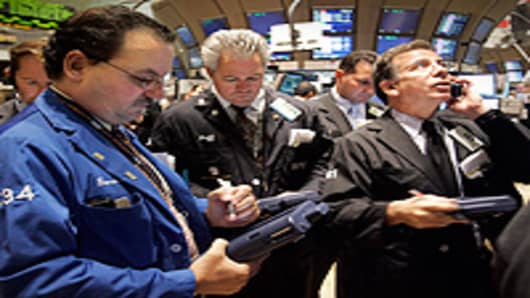With the stock market on edge, now may not be the time to start taking big risks. But it's not time to run and hide either.
The promise of aggressive federal intervention combined with a high level of anxiety on Wall Street makes now a promising opportunity for investors, but primarily for those who gauge their risk carefully.
"You have to take a step back and look at your allocations," says Charles Massimo, president of CJM Fiscal Management. "I would take this opportunity to really do a gut check."
With an emphasis on passive management, Massimo's firm in normal times counsels clients primarily toward investments centered on funds that are well-balanced and focus on long-term return.
But as the financial crisis continues to unwind, he says the investing philosophy takes on even greater importance. Investors can get crushed in markets like these especially when trying to cherry-pick stocks that may look undervalued but in reality still have room to fall or risk collapsing altogether.
For Investors
- Five Stocks for Self Defense
- The Bailout and Your Bottom Line
- Cramer: Sell, Sell Sell This Market
- Pros: More Gloom and a Silver Lining
- Five-Star Manager's Strategy: Go Cycical
"This is a perfect reason why passive management--buying broad-based indexes versus individual stock--means so much. We've taken over a lot of accounts that were loaded up on Lehman Brothers, AIG, Bear Stearns," Massimo says. "When you miss with an active manager you can miss huge. When you miss with a passive manager you miss narrow."
From their perspective, Massimo recommends funds that are especially weighted toward small- and mid-cap companies, like the ones managed at Dimensional Fund Advisors.
He also likes emerging market funds, citing Vanguard as one company focusing on strength areas in the global economy.
Greater Return, Greater Risk
Of course, that conservative approach can also lead to lower returns than with portfolios that are heavier on risk. But at a time when the market is whipsawing on an almost endless stream of news, risk adversity seems to more in vogue than in quite some time.
"I see this as an upside for the market, but a cautious one," says Michael Kresh, president of M.D. Kresh Financial Services. "In this case I can't even begin to think how to pick stocks. (Investing now is) really on a broad base, but making sure we're not over-emphasizing financials. I would still be light there."
Kresh is having his clients pull cash off the sidelines and putting it into exchange-traded funds across a broad range.
Where to invest now. Watch video at left.
Essentially, he's advocating a rebalance that brings particular underweight areas of portfolios back into balance with stocks and less in cash.
He likes ETFs that are based on index performance rather than market cap as indications continue to build that the market may be reaching a bottoming point. As far as particular sectors goes, Kresh thinks consumer-related stocks could see a rebound, though he's basing his ETF recommendations strictly on individual needs, and is making sure portfolios are equal weight or overweight every sector but financials.
"There's just so many moving parts that I don't feel comfortable in making individual company picks," Kresh says. "This is a case of the market is under stress, people are afraid. It's almost always a signal for the bottom or a near bottom of the market."
It's All About Perspective
In such a volatile environment, probably the most important thing for investors is to understand their own needs and to use risk management to meet them.
"You have to step back and take a macro view and you can't panic," says Kathy Boyle, president of Chapin Hill Advisors. "You have to look at what's your near-term objective and what's your long-term objective."
For bright spots in the financials, check out this video.
Boyle has been a market bear for months and has used aggressive but risky inverse ETFs to capitalize on downward moves in the market and individual sectors. But after the short-selling ban went into effect last week, a number of the ETFs that short the market halted trading.
"We still think the market's going further down," Boyle says. "I don't think I'd rush in and chase them here, but if we get another rally I would still add to my inverse ETFs."
Among those she's looking at are Pro Shares UltraShort Real Estate and the Pro Shares UltraShort FTSE/Xinhua China 25.
She also likes some commodity plays in the current environment, including PowerShares DB Commodity Index Tracking Fund and the SPDR Gold Shares
Broadly speaking, though, she calls the current investment environment "very difficult" and says there's nothing wrong with holding cash in safe places until the smoke clears.
The stock market gyrations have spurred a strong dash for safety to Treasurys, pushing short-term yields to almost invisible levels.
- Details of the Democratic Bailout Proposal
- What the Treasury Plan Will Cost
- Should Homeowners Be Bailed Out? Poll
- Protect Your Portfolio: Money Guide
But municipals and corporate bonds also have gained favor, and investment advisers like the relatively lower risk but advise against going out to the long end on them.
"With the flight to quality, Treasurys are still yielding very, very low and we have to be cautious. We're very, very short," Kresh says. "Right now we're not making any bond purchases that are out more than three years. I do expect interest rates to change once the dust settles. I certainly wouldn't be buying a 10-year bond right now."
"When you start going beyond three years you start taking on a lot more risk with no return," agrees Massimo. "With bond funds you want to minimize risk as much as possible."
For Traders, Some Opportunity
At the same time, the approach for investors as opposed to short-term traders is going to diverge.
For traders, now could be the time to jump in and take a seat in the wild rise that is the stock market as volatility creates opportunity.
"The pool of available talent in terms of stocks is certainly narrowing, as it does in weak markets. But there are still some pockets of strength," says Richard Sparks, senior analyst at Schaeffer's Investment Research. "To my customers, I would be sticking with those areas that have rewarded you so far. Don't try to be a hero, don't try to buy things just because they've gone down a tremendous amount. You stick with strength until that doesn't work."
Agricultural chemicals is one area Sparks thinks will hold up amid the economic downturn, and he recommends Monsanto to follow that move.
Some familiar consumer stocks at well-operated companies also are poised for growth, and Sparks backs Panera Bread and Urban Outfitters.
At the same time, he advises patience as the market's drama unfolds.
"There's plenty of money to be made on the way up," Sparks says. "You don't have to buy yet."




